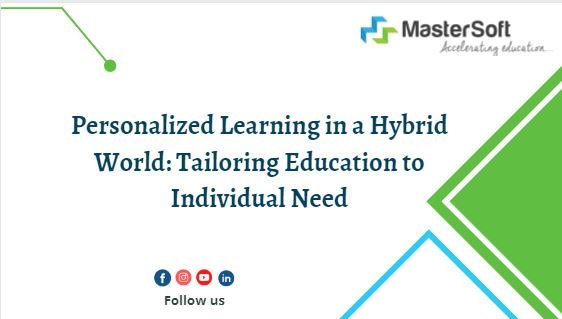Personalized Learning in a Hybrid World: Tailoring Education to Individual Need

The emergence of hybrid learning, which combines face-to-face instruction with online learning, has given educators a special chance to adopt individualized learning strategies. A pedagogical approach called personalized learning adjusts instruction to the needs, interests, and skills of each student. The idea of customize learning will be discusse in the context of a hybrid world in this blog, with an emphasis on how it might improve cognitive learning and encourage a better grasp of subjects.
The Development of Hybrid Learning
It recognizes the value of integrating technological tools and internet resources into the educational process. In a hybrid learning setting, students participate in a mix of face-to-face lessons and online activities, resulting in a flexible and adaptive method of teaching.
The Benefit of Hybrid Learning
- Flexibility In Learning Environments
With hybrid learning, students may select the environment and method that work best for them.
- Personalized Pacing
The strain of adhering to a set class schedule is lessen because students are allow to reread materials, watch lectures again, and take exams whenever they are ready.
- Enhanced Resource Access
Students have access to a multitude of digital materials thanks to hybrid learning. Education is make more interesting and available by the availability of e-books, interactive simulations, and multimedia content that accommodates various learning styles.
- Data-Driven Insights
Digital learning platforms for hybrid instruction gather information on student performance.
- Preparation For The Digital Age
In a society where technology is use more and more, hybrid learning gives students the digital literacy skills they need to succeed in the workplace in the future.
What Personalized Learning Is All About
At its foundation, customized learning seeks to identify and address each learner’s distinctive features. It’s a method of teaching that emphasizes uniqueness and uses technology and data to provide individualized learning experiences. Here is how customized learning and hybrid education interact:
- Content That Is Customize
In a hybrid learning environment, teachers can choose and present material that fits with students’ interests and skills. Beyond a curriculum that fits everyone, this customisation makes sure that students are intereste and challenge.
- Adaptive Evaluation
Adaptive assessments, which change the difficulty of questions based on a student’s performance, are a common component of personalized learning systems.
- Progress Tracking
Systems for hybrid learning monitor students’ progress and give immediate feedback. This data may be use by teachers to pinpoint areas where pupils need more help or to move ahead.
- Choice For The Student
Personalized learning acknowledges the value of granting students agency over their education. In a mixed setting, this entails giving them the freedom to select the subjects that interest them, look for resources that speak to them, and establish their own learning objectives.
- Differentiated Instruction
With hybrid learning, teachers may successfully differentiate their lessons. To ensure that no student falls behind, they can offer more materials, different tasks, or one-on-one coaching to those who need it.
Also, Read more about How x*x*x is equal to 2 and enhance your knowledge.
Personalization to Improve Cognitive Learning
The ability to improve cognitive learning is one of customized learning’s most significant effects in a hybrid environment. Cognitive learning is the process of picking up information, abilities, and understanding via the use of mental functions including perception, logic, and problem-solving. How customized learning does this is as follows:
- Engaged Learning
Personalize learning environments are make to keep students interest in their studies. Their level of involvement has increased, which benefits their cognitive growth.
- Solving Problems
Personalized learning allows students to take on challenging tasks that match their interests and skills by adjusting learning experiences to meet individual requirements. This method of problem-solving encourages cognitive development.
- Metacognition
It is the awareness and comprehension of one’s own mental processes. Personalized learning fosters metacognition. Students who are give the freedom to decide how they want to study become more cognizant of their learning preferences and methods, which promotes cognitive self-regulation.
- Critical Thinking
Open-end questions and critical thinking activities are frequently include in customize learning experiences. These exercises promote cognitive abilities that are necessary for lifelong learning by encouraging students to assess, analyze, and synthesize knowledge.
- Individualized Pace
Everybody’s cognitive development is unique. By letting students advance at their own speed, personalized learning accounts for these variations. This guarantees that cognitive development happens naturally and without feeling hurried or pressured.
Personalized learning in a hybrid environment stands out as an effective strategy for supporting cognitive growth and developing the particular potential of each student as education continues to advance in the digital era. Teachers may design dynamic and engaging learning experiences that enable students to develop into critical thinkers, problem solvers, and lifelong learners by adapting the curriculum, assessments, and support to each student’s requirements. We discover a road to a more inclusive, successful, and student-centered educational environment where the pursuit of knowledge is as unique as the learners themselves at the confluence of customized learning and hybrid education.




